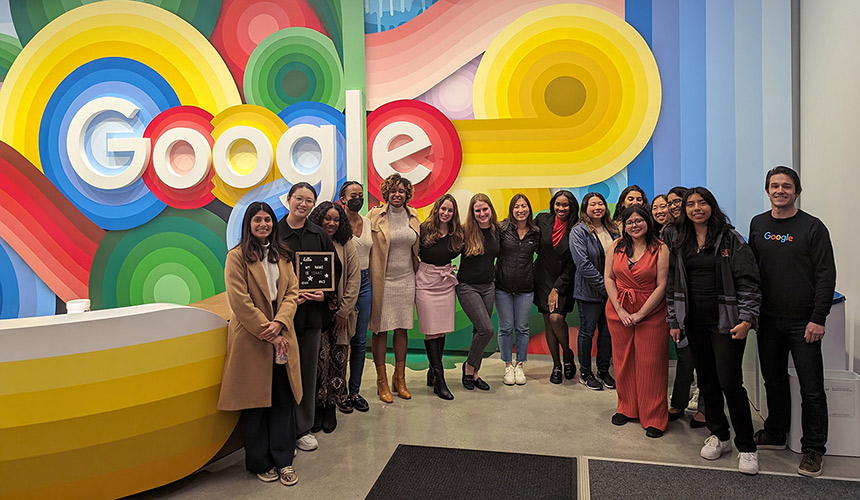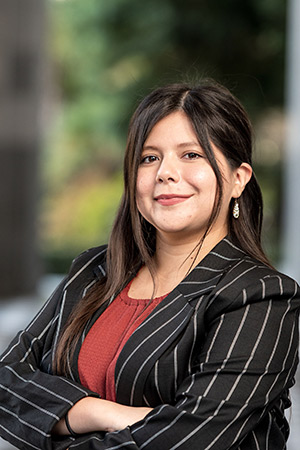Bussiness
Women in Business Law Emerging Leaders Program builds confidence and community

By Andrew Cohen
Angeli Patel ’20 had read about it, heard about it, and talked about it. But as a young attorney, seeing firsthand the gulf between women and men in corporate workplace settings — from empowerment to confidence to leadership roles — was especially challenging.
When she became executive director of the law school’s Berkeley Center for Law and Business (BCLB) in January 2023, Patel promptly set out to confront that. The Women in Business Law Emerging Leaders Program she created aims to accelerate the careers of talented and motivated future female lawyers.
“I got very lucky with mentors and programs in my career that created a space for me to reflect on who I was as a professional and how I wanted to chart my path,” says Patel, who runs the initiative with BCLB Program Coordinator Lenique Frazier. “But not everyone gets that lucky. So I wanted to intercept this early in the law school experience and show women students that they belong in the business world just as much as anyone else — and they can shape it.”

Berkeley Law’s competitive program — Patel and Frazier review the applications — selected an inaugural cohort of 18 students last year and 19 this year. The students receive numerous opportunities to develop their networks and career strategy through site visits to major companies such as Google and Lyft, discussions with general counsels, events with top firms, coaching sessions on networking and leadership, resume reviews, receptions, and more.
When Johnsenia Brooks ’26 co-founded a social events curation brand before law school, it marked “the first time I ever saw myself as a ‘business woman,’ taking ownership of all the triumphs and risks that come with running a business in the entertainment industry.” She and other participants praise the powerful community the program creates, its focus on connecting students with the larger business law field, and the openings it generates for them to more confidently pursue business law opportunities.
Brooks eagerly applied to the program, calling it “the perfect chance for me to learn firsthand from companies whose products I use in my everyday life. I was really excited at the fact that the Emerging Leaders Program is for women and led by women.”
Building a foundation
This year’s students have attended a welcome dinner and a “You and the Law: Finding Meaning in Your 1L Journey” field trip to the law firm Cooley. Later in the school year, they will visit Lyft and Salesforce, take part in events at other firms, and attend training sessions focused on networking tips and how to present oneself.
• UC Berkeley is ranked No. 1 among universities in the United States for generating women entrepreneurs, and No. 1 for overall startup founders and venture-backed companies
• PitchBook, a data provider for private and public equity markets that issues the annual rankings, notes that the school leads the nation in businesses founded by women and the amount of capital raised by women
• The report notes that 283 UC Berkeley women graduates have founded 281 companies and raised $7 billion — all metrics that rank first in the world
Patel and Frazier tailor the internal workshops to help students chart out how to make most of their first year, prepare them for exams, teach them to effectively use LinkedIn and other networking tools, and highlight how best to interact with business law professionals. The final workshop focuses on how and when to lead, illustrating how to recognize when to proactively take initiative to get ahead as new associates.
“Coming from the East Coast, this program opened my eyes to a whole new market and career path I never knew was available to me,” Brooks says. “The Emerging Leaders Program makes it possible for first-generation professionals like myself to imagine a career in business law.
“You become more confident getting to talk to boss women and learning how they’ve navigated their careers. It makes me feel a sense of comfort knowing that although life can be unpredictable, success is attainable, especially when you have a strong community of women rooting for you and making space for you at the table.”
The goal, Patel explains, is to empower students by building a community first. From there, programming aims to expose them to the vocabulary of corporate professionals, bring them into corporate spaces, help them visualize their futures in those spaces, and create a productive environment in which to learn about business law’s “soft skills.”
“A disproportionate amount of women take themselves out of the running in these spaces simply because they don’t feel qualified enough, compared to men who will often shoot their shot even with minimal qualifications,” Patel says. “This is a symptom of what I call a confidence gap that can only be solved through empowerment and mindset shift.”
From all backgrounds
While some women bring strong business experience to the program, others approach it as a valuable new asset to acquire. Alejandra Zamora ’26 worked exclusively in the public sector before law school, joined the program to learn more about business law, and is now considering pursuing an in-house attorney position at a company.

“After our site visit to Google, I felt inspired to learn more about the ever-evolving legal issues tech companies face,” Zamora says. “While I don’t know where my career will take me, the Emerging Leaders Program opened my eyes to new opportunities and spaces that I would not have envisioned myself in before.”
In addition to learning about the under-representation of women in legal and corporate leadership positions, Zamora credits Patel and Lenique for harboring “ a community of supportive women” and relishes the friendships she forged with fellow cohort members.
“We need more programs like this because we need to build community and seek mentorship from successful women,” Zamora says. “Angeli told us that she created the program she wished had existed when she was in law school, and similarly I think we emerging leaders have to create the community we want for ourselves and the next generations of women attorneys.”
Going forward, Patel hopes to expand the program’s reach — from resources to cohort sizes to collaborations with more companies in the East Bay and Silicon Valley.
“I hope to see this program get more funding so we can make it available to more students,” she says. “For us, success is when students realize they are the masters of their own fate and creators of their own future.”









